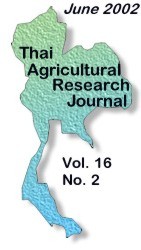ThaiScience
ThaiScience
THAI AGRICULTURAL RESEARCH JOURNAL
Volume 39, No. 03, Month SEPTEMBER, Year 2021, Pages -
Resistance of goosegrass (eleusine indica (l.) gaertn.) to aryloxyphenoxy-propionate herbicides in thailand
Jarunya Pinsupa, Aussanee Chindakul, Terdpong Mahawong, Akekarat Tanutong, Pruchaya Ekatin, Yurawan Anantanamanee, Suphannika Intanon
Abstract Download PDF
Goosegrass (Eleusine indica (L.) Gaertn.) becomes a problematic weed in many cropping systems and some goosegrass populations have been reported to be resistant toaryloxyphenoxy-propionateherbicides (APH).This studyaimedtotest whether100goosegrass populations collected from 100 vegetable fields in Thailand in 2018 were resistant to APH, fenoxaprop-P-ethyl, fluazifop-P-butyl, haloxyfop-R-methyl, propaquizafop, and quizalofop- P-tefuryl, and to evaluate resistant level in some populations using whole-plant dose-response assays. The study was carried out in greenhouse of Weed Science group from January to October, 2019. Results revealed that some goosegrass populations were resistant to all five tested APH. There were 77% of populations resistant to fenoxaprop- P-ethyl, followed by fluazifop-P-butyl, haloxyfop-R-methyl, propaquizafop, and quizalofop-P-terfuryl at 27%, 26%, 25% and 23%, respectively. When divided by regions, the resistant populations were found greater in the central region than in the north and northeast. The GR50 values for fluazifop- P-butyl in resistant populations (GR50of P58 =133.85±+38.45 and GR50 of P26 =146.42+±53.07) were more than 3,660.50 and 3,346.25 times greater than for the S population (GR50= 0.04+0.04), respectively. The highest resistant level to fluazifop-P-butyl compared to other tested APH. Aryloxyphenoxy-propionate herbicides would have least potential use to control goosegrass in vegetable fields in the future if these resistant populations spreads widely.
Keywords
Goosegrass, post-emergence weed control, vegetable crops, herbicide resistant weed, aryloxyphenoxy propionate herbicidesTHAI AGRICULTURAL RESEARCH JOURNAL
Published by : Department of Agriculture
Contributions welcome at : http://it.doa.go.th/
